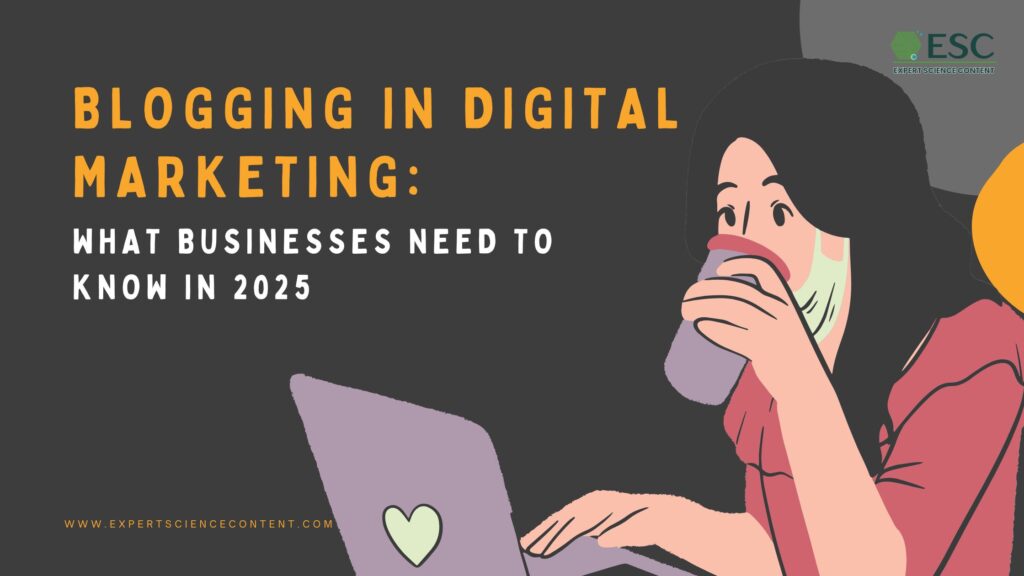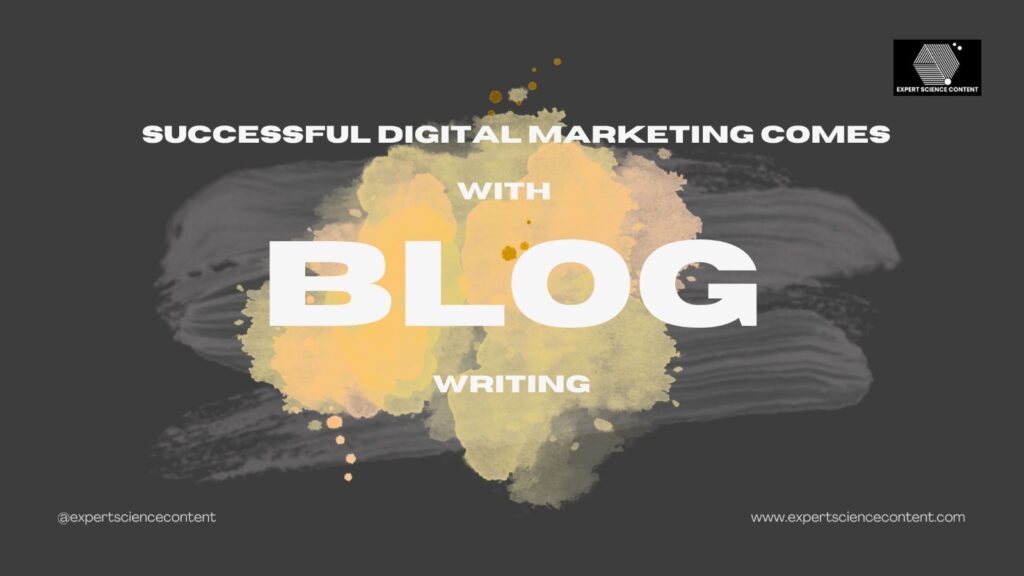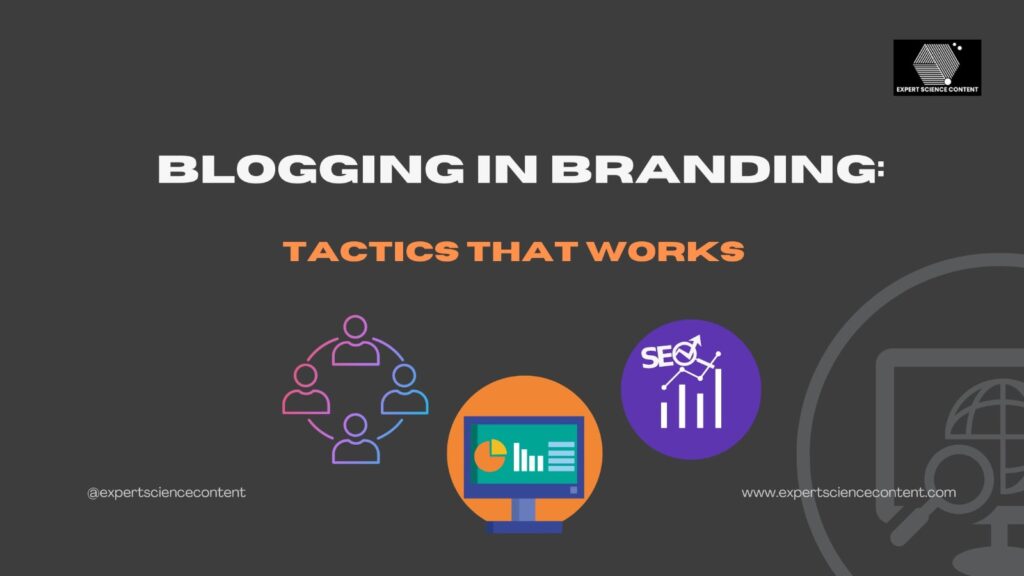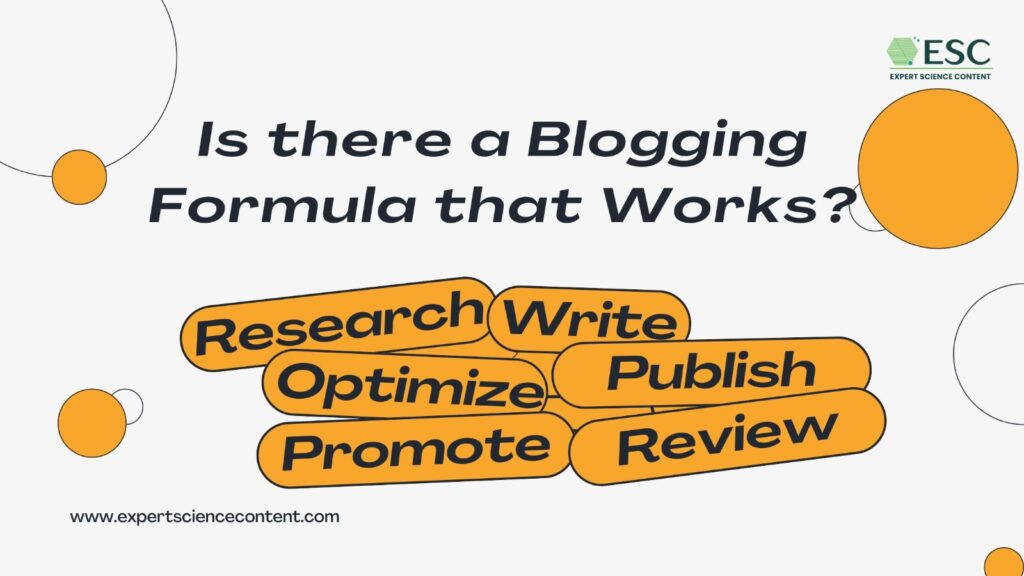Blogging in Digital Marketing: What Businesses Need to Know in 2025
- Published By: Dr. Anindita Talukdar
- Published On: July 31, 2025
- 7 Minutes to read

Blogging in Digital Marketing: An overview
Today’s fast-paced digital era is all about knowing more the basics of digital marketing, you need to stay ahead with smart, conscious, and consistent strategies. The most important strategy for branding that continues to stand strong (and even stronger in 2025) is blogging.
But as most of us think blogging is old-school!
No, it is not. In fact, blogging in digital marketing has evolved far beyond personal stories or casual postings. Blogging in branding is now a central pillar of promotion, lead generation, audience engagement, organic traffic, and SEO growth. Whether you’re a business owner, entrepreneur, a marketing student, or a budding digital professional, blogging is something you can’t afford to overlook.
Let’s break it down together step by step.
Think of blogging as your brand’s voice in action. It’s like a magazine article, updated and optimized on a regular interval for targeted audiences. A well-researched and SEO optimized blog speaks directly to potential customers, answers their questions, solves their problems, and builds brand trust.
Blogging in digital marketing isn’t just about content; it’s about connection. It helps you providing:
- Brand identity
- Regular audience engagement
- On-line visibility to Improve your search engines ranking
- Share your expertise and build credibility
So, yes, blogging is no longer optional—it’s essential for your brand presence and digital marketing.

Successful digital marketing comes with blog writing:
Any type of successful digital marketing strategy is to focus on driving organic traffic and the most effective way is blog writing. Thus with proper planning and execution, blog writers can guarantee promising results.
Most importantly, blogging is more audience-centric and nurtures a loyal relationship with them. It also helps brands to keep an engaging interaction via comments and ping backs. This is precisely why blogging is an integral part of digital marketing.
Let’s explore the key benefits of blogging that make it a non-negotiable tool in your digital marketing toolkit:
1. Blog Writing Drives Organic Traffic
Every time you post a new blog, you’re creating a new entry point for search engines to discover your digital presence. With research backed content, smart keyword usage, consistency in posting, and engaging topics, your blog becomes a magnet for organic traffic.
So instead of pushing your message out, you’re pulling your audience in.
To learn about how to write an engaging blog, please read our recent blog post on
“How to write an educational blog: A complete guide for 2025”
2. Boosts Search Engine and Website Visibility
Blogging gives search engines new content to crawl and engaging content with rich-keywords, helpful, and well structured performs better in digital space. With both on-page SEO (like headings, meta tags, keywords) and off-page SEO (like backlinks), your one blog can support your entire website’s visibility. The consistency of posting blogs regularly supports your online visibility even better.
3. Establishes Brand Authority
The more blog writers write blogs on a relatable topic, the more your readers—and search engines—see you as an expert. In any industry, especially in tech, health, or education, blogging in branding helps build a trustworthy image of your digital product. This leads to long-term engagement and loyalty from your audience.
Think of it this way: If you needed a scientific explanation, would you trust a vague site or one maintained by a subject matter expert with well researched, consistent, insightful posts? Exactly.
4. Encourages Audience Engagement
Many successful company blogs have evidence to prove that they generate results and blogs are 63% more likely to have an effect on purchasing decisions than conventional articles like magazines. Blog writing is the main door to open conversation with your audience. Through comment sections, email responses, and social media shares, your readers can interact directly with you. This kind of two-way communication helps in building community—and community drives brand loyalty.
5. Supports Other Marketing Channels
After posting a well structured engaging blog, the single blog can be repurposed into 5 different tools, such as:
- Social media posts
- Social media reels
- Newsletters
- Video scripts
- E-books and whitepapers
A blog is a content goldmine. A strategic blog works across your digital presence.
6. Cost-Effective Marketing
As we all know the cost for marketing but unlike conventional paid ads that stop the moment you stop paying, a blog keeps working for your digital product long after it’s published. If optimized and written well, an old blog post can continue bringing traffic for months or even years.
Blogging in Digital Marketing: More Than Just Words
In digital marketing, consistency is everything—and your blog is the ideal best platform to tell your brand story repeatedly, clearly, and with purpose. Through blogs, you can:
- Show your tone (Are you friendly, informative, bold, academic?)
- Clarify your mission (What value do you offer?)
- Connect emotionally (Why should your audience care?)
This makes blogging in branding a powerful ally. Blog writing is not only about what you say, but how often and how well you say it.
Need Engaging, Expert-Level Content for Your Brand? Let’s elevate your digital presence

Blogging in Branding- Tactics That Works
Are you serious about writing blogs and using blog to fuel your digital presence with strategy, here are some practical tips to help you grow:
1. Content with Keywords
Don’t just write, search and use relevant keywords in your blog naturally without changing the meaning and tone of your content (like blogging in digital marketing is the key for your growth right now). Most importantly don’t overstuff them—write for humans to connect emotionally first, search engines second.
2. Infographics for Visual Appeal
Content is the king but visuals always help your audience to get attracted and by simplifying complex data makes your content memorable. Use graphs, charts, or illustrations to break up long text and boost shareability.
3. Effective Call-to-Action (CTA)
CTA is a very crucial element for marketing. Every blog should tell their readers what to do next. Whether it’s “Read more,” “Download a free guide,” “making a purchase,” “signing up for a service,” or “Contact us,” a CTA keeps readers moving down the funnel.
4. Multi-Channel Sharing
Once you publish your blog, don’t just stop there, share your blogs on platforms where your audience already hangs out—Instagram, LinkedIn, Facebook, or even WhatsApp. Blogging is always effective 10x more when supported by consistent distribution.
5. Internal and external linking
With a precise and targeted CTA don’t forget to put links. It helps your blog to reach a certain audience who can be your targeted audience. Links are words that act as hypertext, it takes the reader to a different page on the internet. It is crucial for various reasons, including enhancing user experience, improving organic traffic, enhancing SEO, and establishing credibility. They help readers navigate to related content, provide additional information, and demonstrate expertise.

Is there a Blogging Formula that Works?
Yes, there is. If you use blogging for digital products, you can follow a certain formula to get 100% results. Let’s explore the basic and most effective blogging formula for branding:
- Research: Know your audience’s questions and problems
- Write: Ask relatable questions, offer solutions, insights, similar topic links, or tips—be helpful!
- Optimize: Use related keywords, alt text, internal links and external links
- Publish: Be consistent and post weekly or bi-weekly
- Promote: Share the blog via all your social media channels
- Review: Always track metrics for your website like time on page, bounce rate, and click-throughs
- Research: Know your audience’s questions and problems
Essential Skills for Blogging in Digital Marketing
If you’re a blog writer, an entrepreneur promoting your product or a beginner in the field, focus on building these blogging skills:
- Content Planning: Know what your audience needs and when they need it
- Creativity & Research: Blend facts with storytelling for powerful content
- SEO Understanding: Basics of search engine algorithms and keyword use
- Analytics Reading: Use tools like Google Analytics to track your blog’s performance
- Engagement: Always engage with your audience, reply to comments, emails, or feedback
Digital Product blogging to learn from:
One of most popular blogging is product blogging, it can be created and published by brands for either promoting their product, educating their target audience or just to entertain them. Most importantly, they should always speak the brand language. Some of the most popular brands for example Myntra, cult.fit, purplle, and tata sampann are using product blogs for building trust for their product and entertaining their audience, and giving 100% results.
Product blogging can even adopt a storytelling style in order to connect better with the audience and to build an emotional connection. A product blog always helps build trust and credential for the brand in the target audience’s mind.
Final Thoughts: Why Blogging in Digital Marketing Remains a Power Move
Blog writing is not just about writing content—it’s about creating conversations, engaging effortlessly, building trust, being consistent and providing value.
In 2025, if you’re not blogging, you’re missing a huge opportunity to increase your brand’s digital presence, authenticity and organic traffic. Whether you’re an entrepreneur, and CEO aiming to boost online visibility, or a student looking to build a personal brand, blogging is your low-cost, high-impact solution.
But blogging is hard and it takes a lot of time to create well researched blog content.
If you’re looking for well-researched, scientifically backed SEO-optimized blogs—whether for branding, websites, or digital marketing projects—we’re here to help. Visit our website www.expertsciencecontent.com for blog writing, content creation, and academic support.

Dr. Anindita Talukdar
The creative behind ESC sharing smart actionable tips and insights to level up writing and research skill.
Join ESC
Get our newsletter
Let’s build your digital voice—one powerful blog at a time.
Frequently Asked Questions
Blog writing is crucial for multiple types of digital marketing strategy. It supports content marketing, improves SEO, fuels email marketing, builds organic traffic, and provides shareable material for social media. Regardless of the type, a well-written blog helps connect with audiences and drive traffic organically.
Various types of digital marketing work hand-in-hand with blog writing. For example, search engine optimization helps blogs rank in search results, while social media marketing uses blog content to engage users. Email marketing distributes blogs to subscribers, and influencer marketing can amplify blog reach. All types of digital marketing benefit from consistent blog content.
Hiring a blog writer with relevant experience and research mindset ensures that your content is strategic, structured, professional, and optimized. A skilled blog writer understands how different types of digital marketing operate and can craft posts that align with each one. From increasing SEO rankings to supporting content for ad campaigns, blog writers help bring cohesion to your digital efforts.
Absolutely! Blogging serves as a foundation for nearly all types of digital marketing. It helps with keyword ranking for SEO, provides content for email newsletters, fuels social media posts, and strengthens brand authority for inbound strategies. No matter which type of digital marketing you're focusing on, blogging enhances its effectiveness.
Consistency is the key! To maximize your results across different types of digital marketing, aim to publish blog content consistently—ideally once or twice per week. This frequency supports ongoing SEO efforts, gives your social media and email campaigns fresh content, and helps build a loyal audience over time.

Your article helped me a lot, is there any more related content? Thanks!